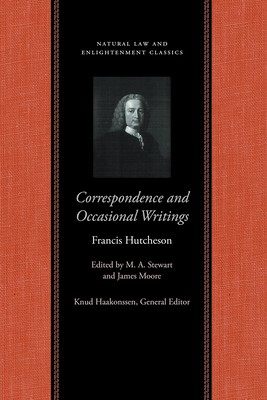
- We will send in 10–14 business days.
- Author: Francis Hutcheson
- Publisher: Liberty Fund
- ISBN-10: 0865976287
- ISBN-13: 9780865976283
- Format: 15.2 x 22.6 x 2.8 cm, minkšti viršeliai
- Language: English
- SAVE -10% with code: EXTRA
Reviews
Description
In light of the fact that Francis Hutcheson was one of the most influential philosophers of the Scottish Enlightenment, it is remarkable that there has never been an edition of his correspondence.
Hutcheson's epistolary offerings include letters published in journals in England, Ireland, and the Netherlands. These letters and occasional writings exhibit his polemical skills in controversy, his differences with Presbyterian orthodoxy, his preoccupation with religious and intellectual liberty, and his loyalty and lasting affection for his friends.
These incidental writings provide valuable insight into Hutcheson's more substantial treatises. His private correspondence and such documents as his will and the declaration he made upon becoming a professor at the University of Glasgow give the reader an impression of Hutcheson's personality and his various life experiences. The volume includes Hutcheson's letters to the London Journal previewing his first philosophical work, An Inquiry into the Original of Our Ideas of Beauty and Virtue, and his philosophical critiques of Thomas Hobbes and Bernard Mandeville.
Hutcheson's private correspondence includes nineteen letters written to the Reverend Thomas Drennan concerning Hutcheson's frustrations with theological orthodoxy in Glasgow and academia in Scotland, thirteen letters from his cousin William Bruce, the famous letters from David Hume, and the letter that Hutcheson wrote to his father in July 1726 on the subject of church government.
Francis Hutcheson was a crucial link between the continental European natural law tradition and the emerging Scottish Enlightenment. Hence, he is a pivotal figure in the Natural Law and Enlightenment Classics series. A contemporary of Lord Kames and George Turnbull, an acquaintance of David Hume, and the teacher of Adam Smith, Hutcheson was arguably the leading figure in making Scotland distinctive within the general European Enlightenment.
James Moore is Emeritus Professor of Political Science at Concordia University in Montreal.
M. A. Stewart is Honorary Research Professor in the History of Philosophy at the Universities of Lancaster and Aberdeen.
Knud Haakonssen is Professor of Intellectual History and Director of the Centre for Intellectual History at the University of Sussex, England.
- Author: Francis Hutcheson
- Publisher: Liberty Fund
- ISBN-10: 0865976287
- ISBN-13: 9780865976283
- Format: 15.2 x 22.6 x 2.8 cm, minkšti viršeliai
- Language: English English
In light of the fact that Francis Hutcheson was one of the most influential philosophers of the Scottish Enlightenment, it is remarkable that there has never been an edition of his correspondence.
Hutcheson's epistolary offerings include letters published in journals in England, Ireland, and the Netherlands. These letters and occasional writings exhibit his polemical skills in controversy, his differences with Presbyterian orthodoxy, his preoccupation with religious and intellectual liberty, and his loyalty and lasting affection for his friends.
These incidental writings provide valuable insight into Hutcheson's more substantial treatises. His private correspondence and such documents as his will and the declaration he made upon becoming a professor at the University of Glasgow give the reader an impression of Hutcheson's personality and his various life experiences. The volume includes Hutcheson's letters to the London Journal previewing his first philosophical work, An Inquiry into the Original of Our Ideas of Beauty and Virtue, and his philosophical critiques of Thomas Hobbes and Bernard Mandeville.
Hutcheson's private correspondence includes nineteen letters written to the Reverend Thomas Drennan concerning Hutcheson's frustrations with theological orthodoxy in Glasgow and academia in Scotland, thirteen letters from his cousin William Bruce, the famous letters from David Hume, and the letter that Hutcheson wrote to his father in July 1726 on the subject of church government.
Francis Hutcheson was a crucial link between the continental European natural law tradition and the emerging Scottish Enlightenment. Hence, he is a pivotal figure in the Natural Law and Enlightenment Classics series. A contemporary of Lord Kames and George Turnbull, an acquaintance of David Hume, and the teacher of Adam Smith, Hutcheson was arguably the leading figure in making Scotland distinctive within the general European Enlightenment.
James Moore is Emeritus Professor of Political Science at Concordia University in Montreal.
M. A. Stewart is Honorary Research Professor in the History of Philosophy at the Universities of Lancaster and Aberdeen.
Knud Haakonssen is Professor of Intellectual History and Director of the Centre for Intellectual History at the University of Sussex, England.


Reviews